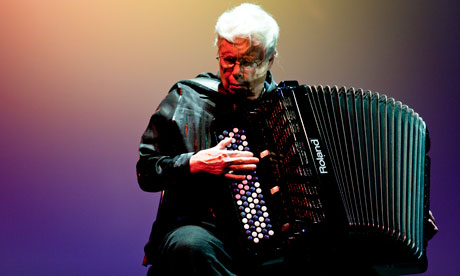Portraits of Women and Music: Electronic Composer Pauline Oliveros Music Legend and Electroacoustic Pioneer
Portraits of Women and Music: Electronic Composer Pauline Oliveros Music Legend and Electroacoustic Pioneer
Electroacoustic composer Pauline Oliveros has left an indelible mark on contemporary music, from her early experimentation with tape delay to the Expanded Instrument System.
When studying electronic music history and the avant-garde, often the names of Terry Riley, John Cage, Morton Subontnick and Nam June Paik come up quickly, but the history of electronic music has a rich tradition of women defying stereotypes and societal prejudice. Women like Pauline Oliveros, Charlotte Moorman, Alice Shields, BeBe Baron, Elaine Radique, and countless others achieved artistic success in the marginal field of experimental and electronic music.Pauline Oliveros began her musical journey at the age of 9 when she began playing her mother's accordion. The long drones produced on the instrument, mixed with Oliveros' exposure to Zen, combined to create the meditative sound that is characteristic of Oliveros' works. While Pauline Oliveros has a great many original scores, some with graphic notation or instructions and some with traditional notation, she has truly embraced the art of improvisation. Additionally, Oliveros experimented with tape delay to create what later became the EIS, or Expanded Instrument System.
The tape delay effect essentially began with the reel to reel. Musicians discovered that by repeating a sound source, using a slight delay in time, reproduced an echo sound when layered with the original sound. The sounds can continue building and building into a wash of repeated original sound material. The Expanded Instrument System, originally a simple tape delay technique, has now blossomed into a true 21st century technique. EIS now uses the program Max/MSP, a complicated software program which, through programming, creates interactivity and live processing.
For a typical performance, Oliveros's accordion output is affected by several effects pedals, not unlike those used by electric guitar players. That sound is then sent through the computer and processed by Max/MSP, where a GUI-based interface allows Oliveros to additionally effect the sound through a variety of knobs, sliders, and switches within the computer interface. The resultant sound is then exported live through the speakers to the audience. While Pauline Oliveros has many options to add additional effects like reverb, flangers, and phasers, the end piece often echoes the simpler tape delay techniques of her earlier work. Compare the similarity between an exercise during a Deep Listening Workshop and a live performance at the Schindler House with the EIS system. Both works are meditative, with a drone-like quality, very serene, with little variance or differentials between sounds.
Pauline Oliveros continues to share her passion for music and improvisation throughout the globe. The Deep Listening Institute, founded by Oliveros, provides retreats for musicians and non-musicians alike, as well as various music opportunities and a catalogue of avant-garde works. Pauline Oliveros teaches regularly at Rensselaer Polytechnic Institute in New York and at Mills College in California.








Comments